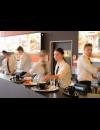Qi, the Dao, and Cell Biology
February 14, 2022
Both Western and Eastern medical traditions base their definition of health on the correct functioning of bodily systems. In the Western paradigm, this is considered optimal cellular metabolism. In the Eastern model, this is considered the smooth flow of qi. Which concept is correct? They both are.
Solving Gut Problems with Taiji and Qigong
December 28, 2020
Learning is a big part of healing, especially in the healing of emotions. We know our emotions influence our physical body. The brain's emotional center needs to be refreshed, nourished, stimulated, and balanced. When you start to learn things you are not familiar with, you start to shift your focus onto new knowledge, new approaches, and a new life. This sort of internal transformation can improve your situation in life. It is as if you are shifting negative energy to positive energy. The more positive energy you have, the better the chance you can be healed.
Qigong and Tai Chi Benefits
November 19, 2018
Now is the time to start your action and make things happen. We all have different plans even though we have similar goals. We must put theory into action. Without action, nothing works. As unique as each of us is, as individually tailored as each healing plan might be, there is one item that should be on everyone's list: exercise.
Qi, the Dao, and Cell Biology
September 3, 2018
Both Western and Eastern medical traditions base their definition of health on the correct functioning of bodily systems. In the Western paradigm, this is considered optimal cellular metabolism. In the Eastern model, this is considered the smooth flow of qi. Which concept is correct? They both are.
Physical Reaction to Information
December 14, 2015
Our right to physically defend ourselves is widely accepted in the contemporary world. Most countries have laws protecting the individual from prosecution when he or she is under direct threat and must defend against bodily harm or even death. What is less clear, though, is the degree to which we are allowed to protect ourselves in that narrow window when an aggressor has decided to attack but has not yet attacked.
Nonphysical Reaction to Information
-
November 2, 2015
We all have the ability to use our instincts. The problem is that we often bury that inherent skill under a lot of what we need to learn to get along in contemporary society. So sometimes we may get a warning message about a potential threat, but then we choose to ignore it, perhaps out of doubt in ourselves, and our feelings, or perhaps because we just don't want to believe we may be in danger. The first task, then, is to hone our instincts through improving our ability to experience anxiety and to proficiently process the information coming in from our environment.
Motivation of the Warrior
-
October 12, 2015
The motivation of the individual or group plays an integral role in determining the final outcome when facing a combative or self-defense situation. Intention that is positively grounded increases focus, strength, speed, and endurance. Think of a mother lion defending her cubs. She experiences anxiety but is fearless in protecting them. People are the same. Through my years of experience, I am convinced that when we are motivated by what is good, we will eventually prevail over those who are not. We all choose to live by either service, which we might even call love, or power.
Power Issues Relating to Women
-
September 28, 2015
According to the World Health Organization, one in three women worldwide will be the victim of violence, including sexual violence. Over twenty-two million women in the United States have been sexually assaulted. The FBI estimates only 46 percent of these assaults are reported. These statistics tell us it is vital for every woman and girl to take courses in combatives, both armed and unarmed. This may seem drastic, but facts are facts, and the danger is real.
Psychology at Work: Developing the "Third Ear" and the Mob Boss
-
August 31, 2015
In his book Listening with the Third Ear, the psychologist Theodor Reik applies the third ear principle to the process of practicing psychotherapy. He says the proficient psychotherapist must be attuned to the instincts, the third ear, in order to truly understand clients and be sensitive to their needs. In exercising this faculty, we hear what is being said, but another "listening" is taking place as all of the information is coming in through the senses, prompting unconscious responses in the form of associations and spontaneous thoughts and feelings on the part of the therapist.
For a busy schedule—Qigong short forms
-
March 1, 2010
The practice of qigong can be very flexible so that it can easily fit into your particular lifestyle. Qigong practice will help you to reach a more carefree state and approach your inner being where healing and prevention begins.









